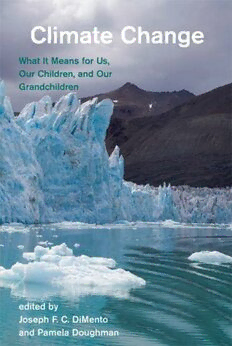
Climate Change: What It Means for Us, Our Children, and Our Grandchildren (American and Comparative Environmental Policy) PDF
233 Pages·2007·1.044 MB·English
Most books are stored in the elastic cloud where traffic is expensive. For this reason, we have a limit on daily download.
Preview Climate Change: What It Means for Us, Our Children, and Our Grandchildren (American and Comparative Environmental Policy)
Description:
Most of us are familiar with the terms climate change and global warming, but not too many of us understand the science behind them. We don't really understand how climate change will affect us, and for that reason we might not consider it as pressing a concern as, say, housing prices or the quality of local education. This book explains the scientific knowledge about global climate change clearly and concisely in engaging, nontechnical language, describes how it will affect all of us, and suggests how government, business, and citizens can take action against it. If people don't quite understand the seriousness of climate change, it is partly because politicians and the media have misrepresented the scientific community's strong consensus on it--politicians by selectively parsing the words of mainstream scientists, and the media by presenting "balanced" accounts that give the views of a small number of contrarians equal weight with empirically supported scientific findings. The science is complex, couched in the technical language of sinks, forcing, and albedo, and invokes probabilities, risks, ranges, and uncertainties. Policy discussions use such unfamiliar terms as no regrets policy, clean development mechanism, and greenhouse-gas intensity. Climate Change explains the nuts and bolts of climate and the greenhouse effect and describes their interaction. It discusses the nature of consensus in science, and the consensus on climate change in particular. It describes both public- and private-sector responses, considers how to improve the way scientific findings are communicated, and evaluates the real risks both to vulnerable developing countries and to particular areas of the United States. We can better tackle climate change, this book shows us, if we understand it. We can use this knowledge to guide our own behavior and pressure governments and businesses to take action.Joseph F. C. DiMento is Director of the Newkirk Center for Science and Society, Professor of Planning, Policy, and Design, and Professor of Law and Society at the University of California, Irvine. He is the author of The Global Environment and International Law and other books. Pamela Doughman is Assistant Professor of Environmental Studies at the University of Illinois at Springfield and an energy specialist at the California Energy Commission.
See more
The list of books you might like
Most books are stored in the elastic cloud where traffic is expensive. For this reason, we have a limit on daily download.
